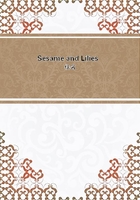
第11章
We want some sharper discipline than that of reading; but, at all events, be assured, we cannot read. No reading is possible for a people with its mind in this state. No sentence of any great writer is intelligible to them. It is simply and sternly impossible for the English public, at this moment, to understand any thoughtful writing,--so incapable of thought has it become in its insanity of avarice. Happily, our disease is, as yet, little worse than this incapacity of thought; it is not corruption of the inner nature; we ring true still, when anything strikes home to us; and though the idea that everything should "pay" has infected our every purpose so deeply, that even when we would play the good Samaritan, we never take out our two pence and give them to the host, without saying, "When I come again, thou shalt give me fourpence," there is a capacity of noble passion left in our hearts' core. We show it in our work--in our war,--even in those unjust domestic affections which make us furious at a small private wrong, while we are polite to a boundless public one: we are still industrious to the last hour of the day, though we add the gambler's fury to the labourer's patience; we are still brave to the death, though incapable of discerning true cause for battle; and are still true in affection to our own flesh, to the death, as the sea-monsters are, and the rock-eagles. And there is hope for a nation while this can be still said of it. As long as it holds its life in its hand, ready to give it for its honour (though a foolish honour), for its love (though a selfish love), and for its business (though a base business), there is hope for it. But hope only; for this instinctive, reckless virtue cannot last. No nation can last, which has made a mob of itself, however generous at heart. It must discipline its passions, and direct them, or they will discipline it, one day, with scorpion whips. Above all, a nation cannot last as a money-making mob: it cannot with impunity,--it cannot with existence,--go on despising literature, despising science, despising art, despising nature, despising compassion, and concentrating its soul on Pence. Do you think these are harsh or wild words? Have patience with me but a little longer. I will prove their truth to you, clause by clause.
(I.) I say first we have despised literature. What do we, as a nation, care about books? How much do you think we spend altogether on our libraries, public or private, as compared with what we spend on our horses? If a man spends lavishly on his library, you call him mad--a bibliomaniac. But you never call any one a horsemaniac, though men ruin themselves every day by their horses, and you do not hear of people ruining themselves by their books. Or, to go lower still, how much do you think the contents of the book-shelves of the United Kingdom, public and private, would fetch, as compared with the contents of its wine-cellars? What position would its expenditure on literature take, as compared with its expenditure on luxurious eating? We talk of food for the mind, as of food for the body: now a good book contains such food inexhaustibly; it is a provision for life, and for the best part of us; yet how long most people would look at the best book before they would give the price of a large turbot for it? Though there have been men who have pinched their stomachs and bared their backs to buy a book, whose libraries were cheaper to them, I think, in the end, than most men's dinners are. We are few of us put to such trial, and more the pity;for, indeed, a precious thing is all the more precious to us if it has been won by work or economy; and if public libraries were half so costly as public dinners, or books cost the tenth part of what bracelets do, even foolish men and women might sometimes suspect there was good in reading, as well as in munching and sparkling:
whereas the very cheapness of literature is making even wise people forget that if a book is worth reading, it is worth buying. No book is worth anything which is not worth MUCH; nor is it serviceable, until it has been read, and re-read, and loved, and loved again; and marked, so that you can refer to the passages you want in it, as a soldier can seize the weapon he needs in an armoury, or a housewife bring the spice she needs from her store. Bread of flour is good;but there is bread, sweet as honey, if we would eat it, in a good book; and the family must be poor indeed, which, once in their lives, cannot, for, such multipliable barley-loaves, pay their baker's bill. We call ourselves a rich nation, and we are filthy and foolish enough to thumb each other's books out of circulating libraries!